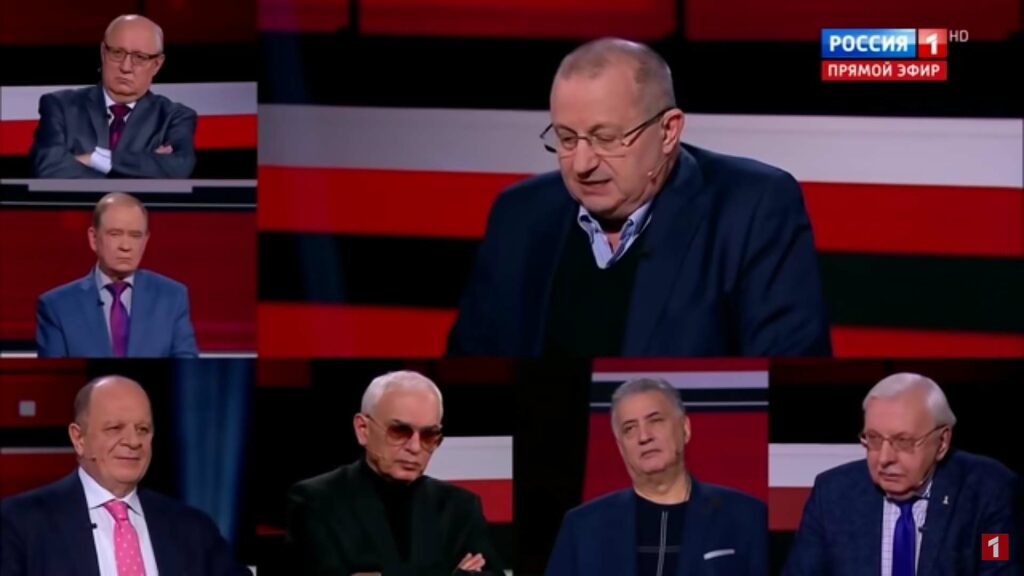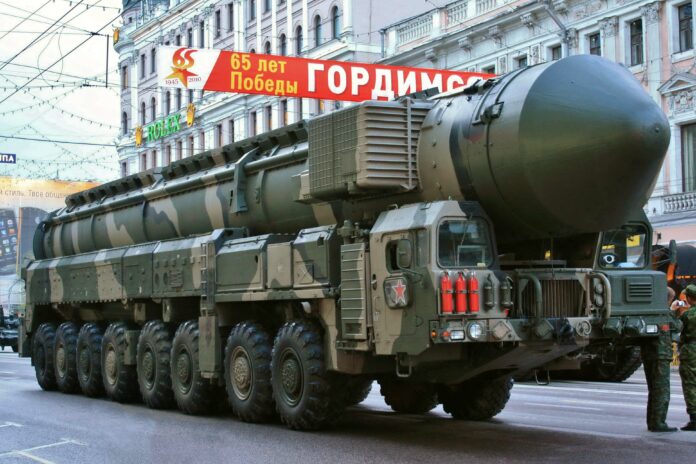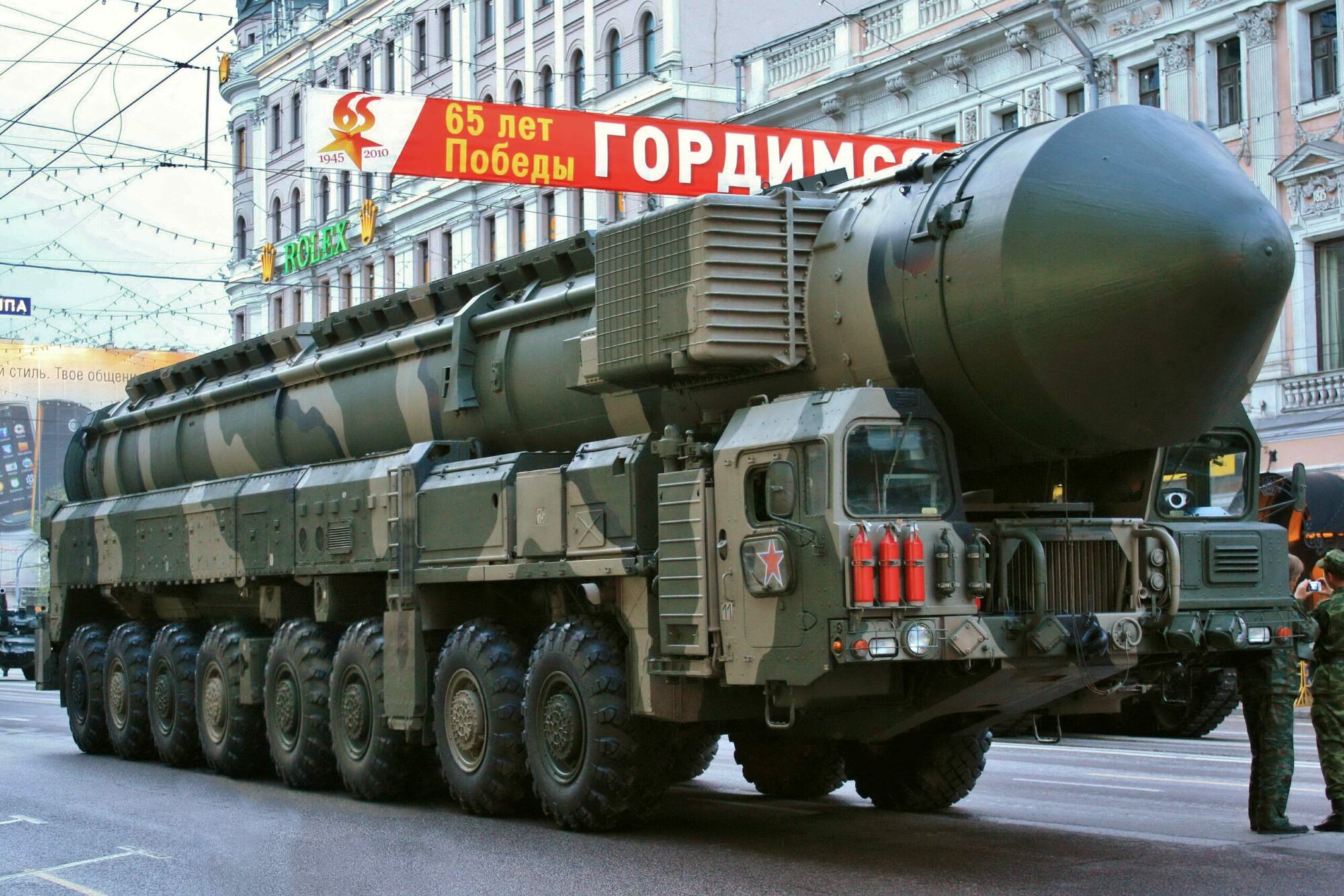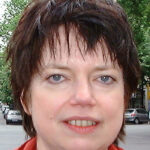After the Westerners’ refusal to accept the Russian ultimatum of December 17, the West is slowly becoming aware that the risk of war with Russia may be real, that it is more than just Ukraine, that Putin, this “latent extremist”, according to the political scientist Gleb Pavlovski, may not just be bluffing. All eyes are focused on Moscow, feverishly watching for clues that may provide a key to Russian behavior.
Some experts, whose stomachs are particularly strong, have had the courage to watch Russian television, rightly believing that it would indicate the direction of the wind. But even those who are armored with a long practice of Putin’s media felt like they were sinking into a horror movie. Let’s give some samples of what the Russian viewer heard on the evening of January 16. During Wladimir Soloviev’s program, we witnessed a torrent of hatred against Ukraine, quickly transformed into a call to murder: “Ukraine will be liquidated”. Variant: “Ukraine will be liquidated by the US”. Other “russophobes” are not forgotten: first and foremost, Great Britain. Dmitri Evstafiev, professor at the Higher School of Economics in Moscow, rants: “We must compel the United States to force the United Kingdom to denuclearize! Because it sucks!!! Britain is a monkey with a grenade!!!”. And of course the Baltic States: “You can’t even call them [Baltic countries] countries”. Europe attracts the worst imprecations, in the foul language of thugs that now characterizes Russian diplomats and “experts”: “If we want, we will fuck the European Union from behind”. These buffoons only ape their president, who at his annual conference, speaking of the West, said: “To hell with you and your concerns!”
Even more chilling is the obvious elation with which a nuclear strike against the West is evoked by the Kremlin’s choir. Propagandists no longer hesitate to claim that Russia could survive a nuclear war, while Western countries would be vitrified. Hiroshima, the Russian viewer is reminded, is a beautiful city, it has become much better than before the atomic bombing. Soloviev yelps: “Who told you that there can be no winner in a nuclear war? I think there can be a winner — Russia!” Not to be outdone, Yakov Kedmi, an Israeli “expert” of the Putin ilk, a devotee of Soloviev’s gallery, roars in turn: “In the event of a nuclear war, Russia will suffer damage but the United States will be destroyed !!!! This land will no longer exist! Just like Europe. Russia will remain, while for a thousand years nothing will grow on the territory of the United States!” Zhirinovsky erupts: “2021 was the last peaceful year for Europe. They [Europeans] are celebrating for the last time… champagne, whiskey… A great tragedy awaits humanity, Europe. After the beginning of an armed conflict in Europe, the number [of victims] will be in the millions. There will be no time to count. The decision can only be made by force. Zlobin (addressing a political scientist specializing in the United States) — stop going to New York! Soon this city will be no more! Europe will be no more. There will be no more Kiev, Warsaw, London.” Zhirinovsky, however, relents in a humanistic burst: “All of Europe should not be destroyed — but London (yes). Let the Scots, the Irish, the Welsh live. But (not) London, always at the heart of anti-Russian propaganda.” On January 21 he clarifies his thoughts on the first channel of the RussianTV: “Ukraine, Moldova, Belarus must become Russian provinces! Nuclear war: we will remain the only superpower! Some countries must be destroyed! Moscow will dictate to the whole world! […] War of total annihilation! The United States and London must be destroyed! Lavrov will bring to Blinken a last document to sign, the act of surrender! The war will last a week! […] Biden is the last president of the United States, he must be protected. There will be no more English language — only Russian!”
This rhetoric also resounds in the Duma. The same Wladimir Zhirinovsky suggested even more unacceptable conditions for NATO, such as the dissolution of the alliance, the destruction of nuclear weapons in the entire European space, except for the territory of Russia, and the restoration of the Soviet borders of 1 January 1990. And after the refusal of the West, Russia has “to implement our advantage in the military-technical field”. Zhirinovsky concluded: “We must solve the problem radically so that only Russia remains among several superpowers. The world will not bear three superpowers (USA, China, Russia). Now we can do it, because only we have such a weapon that no one can threaten us anymore”. The Deputy Chairman of the State Duma, Pyotr Tolstoy, is more modest in his view: Russia must be restored within the borders of the Russian Empire. According to him, when a number of countries that were previously part of the empire join Russia, the Baltic countries and Finland “will crawl on their knees”, realizing “the insignificance of their position”. Another MP, Yevgeny Fyodorov, a member of the pro-Putin United Russia party, also threatened the West with nuclear and biological war on YouTube. In his opinion, Putin could decide to use nuclear weapons. The ultimate option “is a preemptive strike with nuclear weapons,” he said. “Or even just with strategic missiles on a training ground in Nevada. There are no civilians there. If we (give) a warning two or three days before, that’s a very good option. And a demonstration of the seriousness of our intentions.” Delyagin, also a MP, after calling Annalena Baerbock, the German foreign minister, a “trained dog,” makes the ingenious following suggestion: “Why do we need to put missiles in Cuba? That was in the last century. There are territories in the United States that the Americans do not control. Why do we need missiles in Cuba when they can be placed in Los Angeles?”
Metastases of this type of discourse are spreading on social networks and in publications of the Putinophile right-wing groups abroad. Thus, Riposte Laïque published an article by a certain Boris Karpov entitled “Should we get rid of one man to avoid war in Europe and save millions?” which bears all the hallmarks of Russian TV propaganda. The article rants against Emmanuel Macron because “in a speech to the European Parliament, Macron proposed that Europe ally itself with NATO to ‘counter’ Russia”. Thus he joins the ranks of “the ‘lightweights’ of Europe”. “Ukraine of course, a country led by a former clown who has become a puppet of the United States […] The Baltic States, whose total surface area (175,000 km2) with 3 countries is the size of a fly’s crap compared to the surface area of Siberia alone (13,100,000 km2), and whose military power is close to zero. Poland, eternal sower of shit in Europe”. And he reminds us that France has to behave: “if it is certain that on the military level France is something else than the Baltic States associated with Poland, it is all the same too little to tease Russia. Let’s say that if the Red Army (sic) can take the Baltic States in 3 to 5 days and the Ukraine in 5 to 7 days, it will still take a few weeks to settle under the Eiffel Tower. […] So we can reasonably ask ourselves whether it would not be better to get rid of the only Frenchman who talks about making war on Russia, rather than risking the lives of many soldiers and civilians on both sides. Let’s think coldly, let’s put in balance the elimination of a ‘man’, or rather an ‘individual’, not to say ‘a traitor to his country and his people’, and a bloody conflict which will cost thousands of lives on both sides? If in 1939 Hitler had been eliminated, how many millions of deaths would have been avoided?”

The martial raving of these examples are not new. As early as 2015 the political scientist Alexander Bovdunov wrote that, “The final solution of the civilizational conflict [between Russia and the West] can only be the annihilation of one of the parties […] Our goal is therefore to annihilate the West in its current civilizational form” . Wladimir Zhirinovsky boasted: “Today we are succeeding in what we have been trying to do without success for 500 years! And we are changing the West!” In the documentary commemorating the annexation of Crimea broadcasted on Russian TV on March 15, 2015, Putin recalls the imaginary dialogue he had been conducting with the West during those dramatic days: “In the name of what would you go and fight here? You don’t know? As for us, we know. And we are ready for anything…” Zhirinovsky echoes him in an inflammatory interview on June 6, 2015, broadcast by Dojd television: “Shoigu [the Russian Defense Minister] only has to direct his nuclear forces toward Berlin, Brussels, London, Washington. Will there be a war? Not at all — they will say: don’t do anything about it, we agree with you, we are withdrawing. They want to live. […] The Europeans live in luxury, they just enjoy themselves. They don’t want to go to war. If Moscow shows its teeth, they will dissolve NATO. It is enough to tell them: if you do not liquidate NATO in twenty-four hours we will bomb the capitals of the member states. And they will do it to continue to live and have fun.”
Let us remember the crisis of the fall of 2016, from which we can perhaps draw lessons today. On October 3, 2016 the Kremlin had already issued an insane ultimatum to Washington. As a condition for resuming relations with the United States Moscow demanded the abandonment of the Magnitsky Act1, and that of the law of support for Ukraine, a reduction in the number of troops and infrastructure of NATO forces in Eastern Europe, the abandonment of sanctions and… compensation Russia for the damage caused by the counter-sanctions. October 9, 2016 Dmitry Kisselev, one of the stars of the Kremlin propaganda, commented on Russia’s demands on the first channel quoting President Putin’s favorite aphorism: “If the fight is inevitable, strike first” . On October 10 the standard of bread supply in Petersburg in case of war is announced: 300 g per day for 20 days. A city hall official reassured Muscovites that the capital’s bomb shelters could accommodate 12 million people. At the time, Moscow did not hide its ulterior motives: it was expected that the Europeans, “tired of being under the threat of a third world war”, would give themselves leaders “more willing to come to an agreement with Russia than to a confrontation”.
Putin’s March 1, 2018 election speech clearly announced the trend of his future policy. The first part emphasized the need for a “leap forward” in the economic sphere and stated that Russia’s “backwardness” in the technological field threatened its future. The second part detailed for 40 minutes the “Wunderwaffen”, the new miraculous weapons that Russia had and with which it could annihilate the United States and the NATO countries. Putin concluded his long talk with videos of missiles heading for Florida: “You didn’t want to listen to us, now you will listen to us.” In the film World Order 2018 released on the eve of the election, Putin commented on a nuclear strike: “Yes, for humanity it will be a global catastrophe, for the world it will be a global catastrophe. But still, as a Russian citizen and head of the Russian state, I ask the question, do we really need a world without Russia?“ Yavlinsky, the leader of the Liberal Party, reported a conversation with Putin shortly after the March 2018 elections. To his question, “Do you understand that we are close to war?” Putin replied, “Yes. And we will win it…“
May we be forgiven these numerous quotes. We aim to get into the “parallel world” in which Wladimir Putin lives and into the information bubble in which the Russian viewer evolves. Clearly there is a remarkable osmosis between the two: hence the interest in closely monitoring the propagandists’ discourse. Now let us try to understand the genesis of this “parallel world” and the causes of the spell that keeps the Russian population in chains and makes it applaud or tolerate genocidal calls and speeches dripping with hatred that would revolt any normal people.
Let us first attempt to venture into Wladimir Putin’s head. From his training in the KGB, the Russian President draws a fundamental conviction: if men act, it is because they are forced to or because they are manipulated. Someone is pulling the strings. Putin’s vision has a blind spot: it leaves no room for freedom, and his entire policy can be deduced from this infirmity of his psyche. If the Ukrainians rebel against their pro-Russian president, it is because they are manipulated by the West. If anti-Putin demonstrators take to the streets, it is because Hillary Clinton has plotted to create a fifth column in Russia. This perception of the world, which does not take into account the initiative and free will of individuals, necessarily leads to conspiracy and paranoia. The world seen by Putin is corrupted by evil wills (Americans, Westerners, “globalists”, “Soros’ spawn”, multinationals, etc.) that plot day and night against him and Russia. All the negative events that occur are the result of the schemes of these evil forces. This all-round paranoia inevitably leads to a fascination with the apocalypse: since the world (except Russia) is tainted throughout, impure beyond redemption, it must be destroyed. Russia’s mission is to ensure this purification by fire, to hasten the Last Judgment. In November 2018, addressing the Valdai Forum, the Russian president pronounced the following sentence, revealing the eschatological substratum of his thought: in case of a nuclear war “we, as victims of aggression, we, as martyrs, will go to heaven, and they [Russia’s enemies] will simply die. Because they won’t even have time to repent.”
One often wonders how a leader with delusional ideas can drag his people behind him, sometimes to the point of suicide. Such leaders know how to appeal to the dominant passions of the crowd: resentment, hatred, fear. Putin has so far maintained a firm grip on the Russians because he relies on hatred of the West and on a spirit of revenge, feelings that are fueled by a strong sense of inferiority (in 1944, the young Brezhnev, then a political commissar, wrote to his mother: “I miss my native land, Mother. I will go to Paris, climb the Eiffel Tower and spit on all of Europe!2”). First cultivated by the Orthodox clergy during the Moscow monarchy, this hatred of the West flourished from the middle of the 19th century. The Putin circle is visibly influenced by the late Slavophiles who hated Europe. According to the slavophile Danilevski for example, “Europe is not only foreign to us, it is hostile to us”. Danilevski advocates a war against Europe because it will clean up the internal situation of Russia by neutralizing the “Westerners”: “The fight against the West is the only way to cure our Russian cultural ills“. Dostoyevsky dreams of an apocalypse that would destroy in flames the cursed cities of Europe. The very russophile Eugene Melchior de Vogüe who popularized the Russian novel in France reports this episode: “I remember how he [Dostoyevsky] ranted on Paris one evening when inspiration seized him; he spoke of it as Jonah was to speak of Nineveh, with a fire of biblical indignation; I noted his words: ‘A prophet will appear one night at the Café Anglais, he will write on the wall the three words of flame; it is from there that the signal of the end of the old world will start, and Paris will collapse in blood and fire, with all that makes its pride, its theaters and its Café Anglais’.” . “All the wealth amassed by Europe will not save it from its doom, because in one moment all the wealth will disappear”3. Another thinker in vogue today, Konstantin Leontiev, dreams that Paris will be “transformed into a field of ruins and ashes“. For him, war is not to be feared: it is necessary “to prefer the evil caused by a great war to the slow poisoning by Europeanism of the countries towards which the genius of our history carries us”.
Impatient waiting for the Last Judgment is frequently expressed in Putin’s historiography. For Valeri Korovin, deputy director of the Center for Conservative Studies of the Faculty of Sociology at Moscow University, the high point of Russian history is the fifteenth century, when “Russia became an Orthodox empire, heir to Byzantium, with the mission of standing in the way of the Prince of Darkness [the West]. This admirable moment of absolute sacredness, of the majesty of Orthodoxy and of the Russian people […] is the starting point of our Russian greatness, of our golden age”. According to the historian Sergei Perevezentsev, Ivan the Terrible certainly unleashed terror, but it was a particular terror, not the result of madness: tsar of divine right, he “was persuaded that he had the right to punish the sinners here on earth, before the Last Judgment”. Far from having a deranged mind, he had grandiose geopolitical plans and he realized half of them. “He created the model of government of Russia in which we still live, and formulated goals that are still ours.” Putin is finally reviving this tradition, as Alexander Prokhanov, one of those who has contributed most to the spread of apocalyptic discourse in Russia, suggests: “[The annexation of] Crimea confirms the doctrine of the Russian miracle, according to which the Russian world can experience a catastrophe, sink into a black hole, and then resurrect, in spite of historical logic, by virtue of the inexplicable Russian prodigy, that divine mystery that makes Russia immortal and makes the Russian people a people of winners. […] The pressure of the West on Russia will be enormous. We will respond to it by the spiritual mobilization of our society, the consolidation of the people around its leader Putin. Putin is now a statesman without equal in the world, a spiritual leader who exclaimed, ‘Russia is destiny!’ And we are now seeing Russia’s destiny unite with that of its president.”4
The big question today is whether Putin’s brinkmanship is a rational calculation or whether he is driven by the destructive fury of aging dictators who have been abandoned by fortune: Hitler in 1944 felt that the German people had proved unworthy of him and had decided to drag the Germans down with him. His regime managed to hold on until the arrival of the Allied troops.
There are a number of elements that support the first hypothesis. In domestic politics, wartime psychosis leads Russians to turn a blind eye to the decline in their standard of living. As in the Soviet era, the refrain is: “as long as there is no war”. People are willing to tighten their belts and are content as long as there is no war. Thus, warlike hysteria becomes a factor of stability for the regime. However, with considerable disadvantages: the flight of capital accelerates, the economy suffers from uncertainty, and the exodus from Russia accelerates. Entrepreneurs and intellectuals vote with their feet. In foreign policy the immediate benefits are obvious. As Putin said on November 18, 2021, “we must keep our Western partners under tension.” Russia expects the West to breathe a sigh of relief if Russia finally settles for a new piece of Ukraine, instead of occupying it entirely. In this sense, Putin’s war of nerves may pay off. Europe will be more accommodating after the scare of the January days. These calculations may explain the militaristic and chauvinistic orgy we have been witnessing for the past month, even if some people in high places are beginning to understand that all that bragging may become counterproductive: “These irresponsible words that are somehow intended for domestic consumption are carefully recorded abroad and taken at face value, without taking into account our national public policy traditions. Our media are monitored [abroad]. Some imagine that our problems could be solved by war. But this is an illusion.”
However, it cannot be ruled out that the “national leader,” used to win against clueless or complacent partners, has decided to bet all his gains, trying his luck once more, this time risking a lot. Age and perhaps illness are cutting into his future. Why allow others to live when he must die? “Do we really need a world without Russia?” he asked in 2018. Shouldn’t we hear, “Do we really need a world without Putin?” For the Russian president knows that the day he passes away, the whole evil edifice he has built, the whole artificial patriotic hysteria he maintains at great expense, will fall to dust, like a vampire surprised by the first ray of the morning sun.
She has a degree in classical literature and spent 4 years in the USSR from 1973 to 1978. She is an agrégée in Russian and teaches Soviet history and international relations at Paris Sorbonne.
Footnotes
- The Magnitsky Act (2012) introduced financial penalties and visa bans against Russian officials suspected of involvement in the 2009 death of lawyer Sergei Magnitsky, a symbol of the fight against corruption in Russia.
- Quoted in: André Kozovoï, Brejnev, l’antihéros, Perrin 2021, p. 52
- « Introduction to the Diary of a writer : a word of explanation about the speech on Pushkin », 1880
- Izvestia, March 10, 2014.




